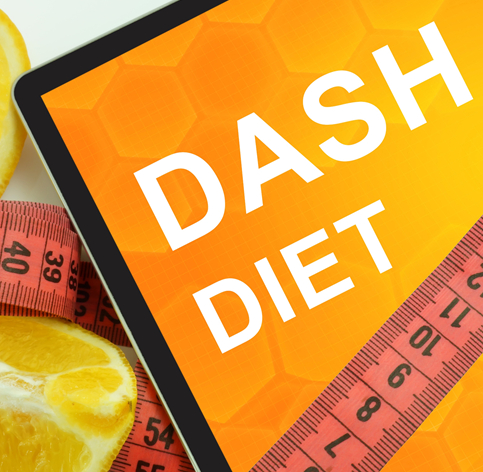
Dash diet
Alternate names: Approche Alimentaire pour Arrêter l'Hypertension, DASH, DASH-Sodium, Dieta DASH, Diète DASH, Dietary Approaches to Stop Hypertension, Régime Dash
Background
The DASH diet is a special eating plan used to help reduce blood pressure. DASH stands for "dietary approaches to stop hypertension."
The DASH diet focuses on eating lots of fruits and vegetables, and reducing total fat, saturated fat, cholesterol, and sodium. The main purpose of the DASH diet is to help control high blood pressure and to prevent the development of disease.
People use the DASH diet for high blood pressure, high cholesterol, heart disease, obesity, and metabolic syndrome. It is also used for stroke, depression, kidney stones, and other conditions, but there is no good scientific evidence to support these other uses.
The DASH diet focuses on eating lots of fruits and vegetables, and reducing total fat, saturated fat, cholesterol, and sodium. The main purpose of the DASH diet is to help control high blood pressure and to prevent the development of disease.
People use the DASH diet for high blood pressure, high cholesterol, heart disease, obesity, and metabolic syndrome. It is also used for stroke, depression, kidney stones, and other conditions, but there is no good scientific evidence to support these other uses.
Safety Safety definitions
When taken by mouth: The DASH diet is likely safe for most people. There are no known side effects.
Breast-feeding: Following the DASH diet for 6 months when breast-feeding is possibly safe. It does not seem to change the growth or health of the infant.
Children: Following the DASH diet is possibly safe for children 6 years and older. The DASH diet and a modified form of the diet have been used safely for up to 3 months.
Special Precautions & Warnings:
Pregnancy: Following the DASH diet during pregnancy is possibly safe. A specific form of the DASH diet called the MAMA-DASH has been used safely for 20 weeks. This form of the diet provides enough nutrients and calories for a healthy pregnancy.Breast-feeding: Following the DASH diet for 6 months when breast-feeding is possibly safe. It does not seem to change the growth or health of the infant.
Children: Following the DASH diet is possibly safe for children 6 years and older. The DASH diet and a modified form of the diet have been used safely for up to 3 months.
Effectiveness
NatMed Pro rates effectiveness based on scientific evidence according to the following scale: Effective, Likely Effective, Possibly Effective, Possibly Ineffective, Likely Ineffective, Ineffective, and Insufficient Evidence to Rate.
Likely effective Effectiveness definitions
- High blood pressure. Following the DASH diet lowers systolic blood pressure (the top number) by about 5-11 mmHg and diastolic blood pressure (the bottom number) by about 3-6 mmHg in people with high blood pressure.
Possibly effective Effectiveness definitions
- Heart disease. Closely following the DASH diet for 7-24 years is linked with a lower chance of heart disease, stroke, and heart failure.
- Colon cancer, rectal cancer. Following the DASH diet is linked with a lower risk of developing colon and rectal cancer.
- Diabetes. Following the DASH diet might help manage blood sugar in people with diabetes. It might also help lower the risk of type 2 diabetes or diabetes during pregnancy.
- High levels of cholesterol or other fats (lipids) in the blood (hyperlipidemia). Following the DASH diet seems to reduce low-density lipoprotein (LDL or "bad") cholesterol and total cholesterol in people with high cholesterol.
- A grouping of symptoms that increase the risk of diabetes, heart disease, and stroke (metabolic syndrome). Following the DASH diet and lowering salt intake seems to improve blood pressure and lower blood sugar and lipid levels in people with this condition.
- Obesity. Following the DASH diet seems to reduce weight in people with obesity.
- Death from any cause. Following the DASH diet seems to be linked with a lower chance of dying from any cause.
- A pregnancy complication marked by high blood pressure and protein in the urine (pre-eclampsia). Following the DASH diet during pregnancy seems to reduce the risk of developing pre-eclampsia.
Dosing & administration
The DASH diet is a special diet used to help lower blood pressure. For a 2000-calorie diet, the DASH diet suggests 7-8 servings of grains, 4-5 servings of fruits, 4-5 servings of vegetables, 2-3 servings of low-fat dairy products, and 2 or fewer servings of lean meats. Snacks and sweets are limited to 5 per week. Salt intake isn't limited, but lowering salt intake can help to lower blood pressure further. Be sure to seek and follow relevant directions from your physician or other healthcare professional before using this diet.
Interactions with pharmaceuticals
It is not known if this treatment interacts with any medicines. Before using this treatment, talk with your health professional if you take any medications.
Interactions with herbs & supplements
There are no known interactions with herbs and supplements.
Interactions with foods
There are no known interactions with foods.
vital.ly has licensed monographs from TRC Healthcare.
This monograph was last reviewed on 07/12/2023 11:00:00 and last updated on 31/05/2018 01:47:36. Monographs are reviewed and/or updated multiple times per month and at least once per year.
Natural Medicines disclaims any responsibility related to medical consequences of using any medical product. Effort is made to ensure that the information contained in this monograph is accurate at the time it was published. Consumers and medical professionals who consult this monograph are cautioned that any medical or product related decision is the sole responsibility of the consumer and/or the health care professional. A legal License Agreement sets limitations on downloading, storing, or printing content from this Database. No reproduction of this monograph or any content from this Database is permitted without written permission from the publisher. It is unlawful to download, store, or distribute content from this site.




